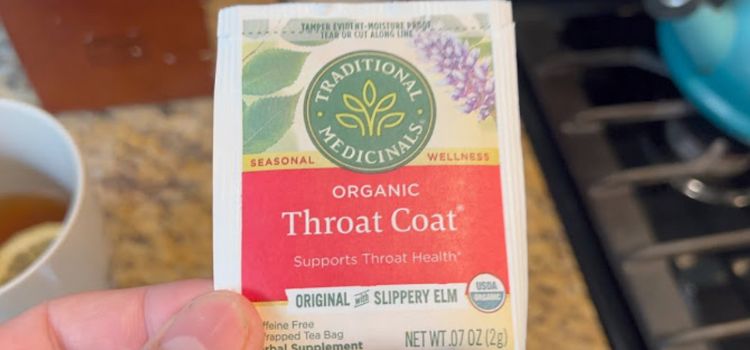Throat Coat Tea is generally considered safe for breastfeeding and pregnant mothers as long as it is consumed in moderation. But it is always advisable to consult with your healthcare provider before consuming Throat Coat Tea while breastfeeding to ensure the safety of both the mother and the baby.

Breastfeeding mothers often seek natural remedies to alleviate symptoms such as sore throat. One popular option is Throat Coat Tea, known for its soothing properties. However, it is crucial to determine whether this tea is safe to consume while breastfeeding to avoid any potential risks to the baby.
We will explore the safety of Throat Coat Tea while breastfeeding, taking into consideration expert opinions and guidelines. This information will help breastfeeding mothers make informed decisions about their health and the well-being of their little ones.
Let’s delve into the topic and find out if Throat Coat Tea is safe for breastfeeding mothers.
What Is Throat Coat Tea?
Throat Coat Tea is a popular herbal tea that has been used for centuries to soothe and relieve throat discomfort. It is made with a blend of herbs and botanicals that are known for their soothing properties. Throat Coat Tea is commonly used to help alleviate symptoms of sore throat, hoarseness, and voice strain.
Here is a breakdown of the ingredients and their benefits:
- Marshmallow Root: This herb has a high mucilage content, which helps to coat and soothe the throat, providing relief from irritation and inflammation.
- Licorice Root: Licorice root is known for its anti-inflammatory properties and can help relieve sore throat and cough symptoms.
- Slippery Elm Bark: Slippery Elm Bark contains a substance called mucilage, which creates a soothing film over the throat and can help relieve pain and irritation.
- Wild Cherry Bark: Wild Cherry Bark has natural expectorant properties and can help relieve cough symptoms.
- Mullein Leaf: Mullein Leaf is often used to help relieve respiratory congestion and can soothe a sore throat.
- Fennel Seed: Fennel Seed has anti-inflammatory properties and can help reduce throat irritation and cough symptoms.
Throat Coat Tea is safe for most people to drink, including breastfeeding mothers. However, it’s always a good idea to consult with your healthcare provider before consuming any herbal teas while breastfeeding, especially if you have underlying health conditions or are taking medications.
They can provide personalized advice based on your specific situation.
Safety Of Throat Coat Tea While Breastfeeding

Throat Coat Tea is generally considered safe for breastfeeding mothers to consume in moderation. However, it is advised to consult with a healthcare provider if symptoms persist or if you have any underlying health conditions or are taking specific medications.
Research And Studies On The Safety Of Throat Coat Tea During Breastfeeding
Research regarding throat coat tea specifically for breastfeeding mothers is limited. However, the ingredients found in throat coat tea have been individually studied for their safety during breastfeeding. Here are some key findings:
- Marshmallow root: This herb is commonly found in throat coat tea and is considered safe for breastfeeding moms. It has been used for centuries for its soothing properties.
- Licorice root: Licorice root, another common ingredient in throat coat tea, is generally safe to consume while breastfeeding. However, it’s important to note that excessive consumption may lead to a decrease in milk supply.
- Slippery elm bark: This ingredient is known for its mucilaginous properties and is generally considered safe for breastfeeding moms.
- Other herbal ingredients: Throat coat tea may also contain other herbs like fennel, cinnamon, and sweet orange peel. While these herbs are generally safe, it’s essential to consult with a healthcare professional if you have any concerns or pre-existing health conditions.
Expert Opinions And Recommendations
Experts in the field of herbal medicine and lactation generally agree that throat coat tea is safe to consume while breastfeeding. Here are some expert opinions and recommendations:
- The American Academy of Pediatrics (AAP) states that moderate consumption of herbal teas, including throat coat tea, is generally safe for breastfeeding mothers.
- According to lactation consultant Kelly Bonyata, throat coat tea can be a helpful way for breastfeeding moms to soothe their sore throats while providing minimal risk to their baby.
- Naturopathic doctors, who specialize in natural remedies, often recommend throat coat tea as a safe option for breastfeeding mothers experiencing throat discomfort.
- It’s important to note that individual opinions may vary, and it’s always recommended to consult with a healthcare professional, such as a lactation consultant or doctor, before introducing new herbal remedies into your breastfeeding routine.
Potential Risks And Side Effects
While throat coat tea is generally considered safe for breastfeeding mothers, it’s important to be aware of potential risks and side effects. Here are a few to keep in mind:
- Allergies: Some individuals may have allergies to certain herbs found in throat coat tea. It’s essential to review the ingredients list and check for any known allergies before consuming.
- Decreased milk supply: Excessive consumption of throat coat tea, particularly those containing licorice root, may potentially lead to a decrease in milk supply. It’s important to consume throat coat tea in moderation.
- Drug interactions: Throat coat tea may interact with certain medications or hormonal therapies. It’s advisable to consult with a healthcare provider if you are taking any medications or undergoing hormone replacement therapy.
As with any herbal remedy, it’s crucial to listen to your body and monitor for any adverse reactions. If you experience any unusual symptoms or concerns, consult with a healthcare professional.
Factors To Consider While Taking Throat Coat Tea

When it comes to consuming throat coat tea while breastfeeding, there are certain factors to consider, such as allergies, medical conditions, and medications. Each of these individual factors can potentially affect the safety of throat coat tea for breastfeeding mothers.
If you have a known allergy to any of the ingredients in throat coat tea, it is important to avoid consuming it while breastfeeding. Common allergens in throat coat tea include licorice root and marshmallow root.
Allergic reactions can vary in severity, so it is important to discuss any known allergies with your healthcare provider to ensure the safety of consuming throat coat tea.
Certain medical conditions may interact with throat coat tea and could pose potential risks for breastfeeding mothers. It is important to disclose your medical history to your healthcare provider to make an informed decision.
Conditions such as diabetes, hypokalemia, and hormonal imbalances may require special attention and monitoring when considering the consumption of throat coat tea while breastfeeding.
Medications such as diuretics, potassium depleting agents, and MAO inhibitors may interact with the ingredients in throat coat tea, leading to adverse effects or reduced effectiveness of medications.
Alternatives To Throat Coat Tea
Breastfeeding can sometimes come with discomforts, especially when it comes to throat-related issues like soreness or irritation. While throat coat tea is a popular choice for soothing these discomforts, it may not be suitable for everyone.
If you’re looking for safe and natural alternatives to throat coat tea while breastfeeding, here are some herbal teas and remedies that you can consider:
- Chamomile Tea: Chamomile tea is known for its calming properties and can help soothe a sore throat. It is considered safe for breastfeeding mothers and can be enjoyed hot or cold.
- Peppermint Tea: Peppermint tea has a cooling effect that can provide relief to a sore throat. However, it’s important to note that excessive consumption of peppermint tea may decrease milk supply, so it’s best to enjoy it in moderation.
- Ginger Tea: Ginger tea has antibacterial and anti-inflammatory properties that can help reduce throat inflammation. It’s considered safe for breastfeeding mothers and can provide soothing relief.
- Honey and Warm Water: Mixing a tablespoon of honey with warm water and sipping on it can help soothe a sore throat. Honey has antimicrobial properties and can provide natural relief without any additives.
- Marshmallow Root Tea: Marshmallow root tea is known for its demulcent properties, which can provide a soothing coating on the throat. It can be a great alternative to throat coat tea for breastfeeding mothers.
Frequently Asked Questions
Is Throat Coat Tea Safe To Drink While Breastfeeding?
Throat Coat Tea is generally considered safe for breastfeeding mothers to consume, as long as it is consumed in moderation. However, it’s always important to consult with your healthcare provider before trying any new herbal products during breastfeeding.
Can I Drink Throat Coat Tea If I Am Pregnant ?
Yes, but it should be always consumed in moderation.
Is Throat Coat Tea Suitable For Nursing Mothers?
While Throat Coat Tea is generally considered safe in the quantities recommended, it is still important to consult with your healthcare provider before consuming it while nursing. They can provide personalized advice based on your specific health conditions and circumstances.
Conclusion
Throat Coat Tea is generally considered safe for breastfeeding mothers, as long as it is consumed in moderation. The tea does not contain licorice, which is known to be potentially harmful during pregnancy and breastfeeding.
However, it is always important to consult with a healthcare provider before trying any new herbal remedy while breastfeeding, especially if you have pre-existing medical conditions or are taking any medications.
The key is to consume Throat Coat Tea in moderation and listen to your body. If you notice any adverse effects or if your symptoms persist, it is important to consult with a healthcare provider. Throat Coat Tea can be a soothing option for breastfeeding mothers with sore throats or throat irritations.
Just ensure that you are using a reputable brand and consult with a healthcare provider if you have any concerns or questions. Remember, every breastfeeding journey is unique, so it is important to find what works best for you while keeping the safety of your little one in mind.
Leave a Reply